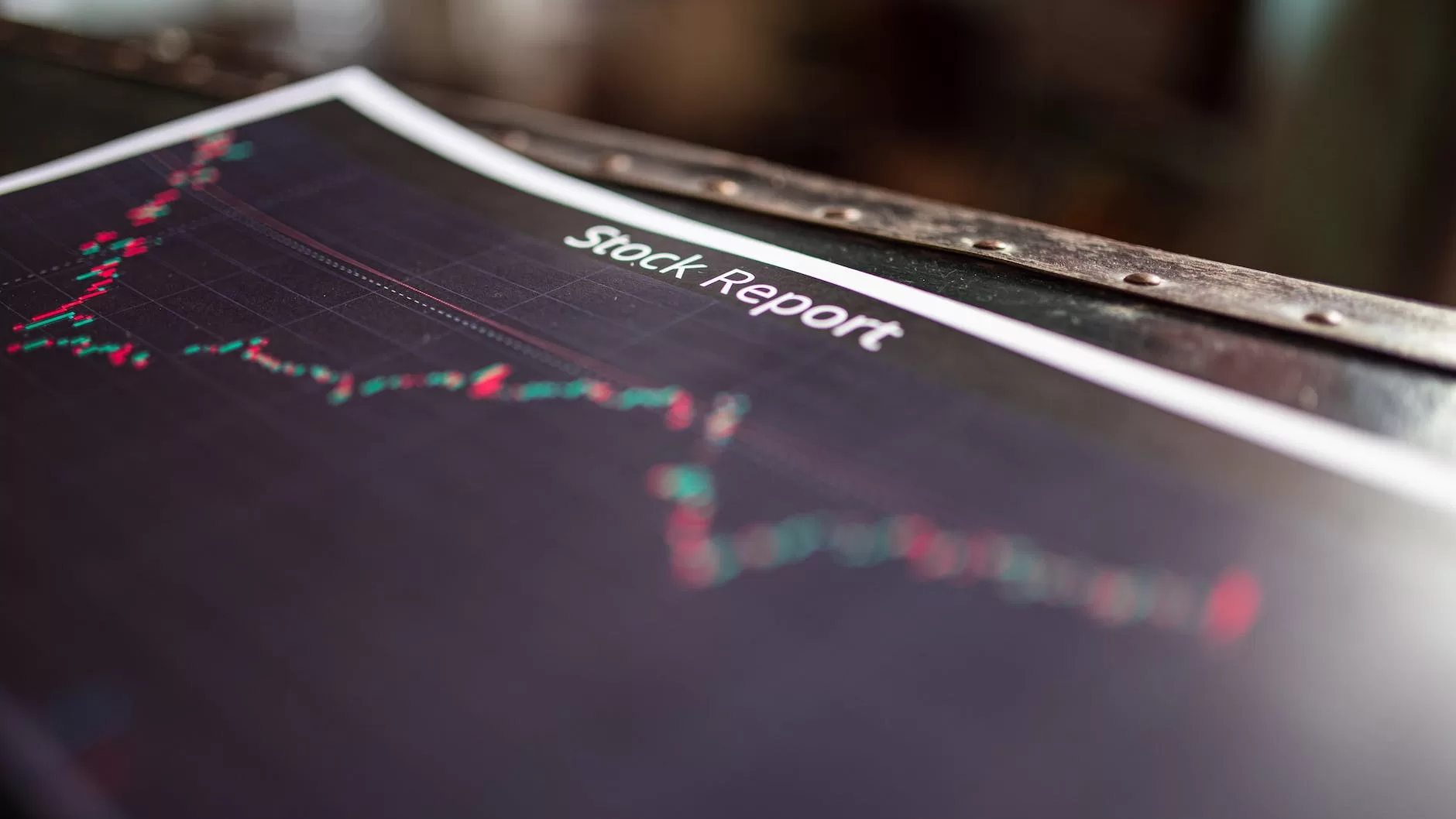Before we examine what makes stock picking risky, here is our disclosure.
Disclosure: This post may contain affiliate links, meaning we earn a commission on purchases made through those links at no extra cost to you. As an Amazon Associate, I earn from qualifying purchases.
Disclaimer: The content on this site is for informational and educational purposes only and does not constitute financial, investment, legal, tax, or any other professional advice and should not be used as a substitute for professional advice. For more details, read our full Disclaimer.
A Universal Truth
Stock picking is hard. It is a universal truth. When it comes to investing, picking individual stocks is one of the hardest things to do. You can do the best research possible and still lose big. I know because I have made some big mistakes picking stocks.
Once you start dabbling in buying individual stocks, the risk you take on skyrockets. You have to prepare yourself for a wild roller coaster ride, as volatility is the name of the game. Sometimes, you will feel excitement as you climb to new heights but then lose your stomach as you plummet. It is enough to make your neck hurt and your stomach ache. I know it sounds scary, and it is.
I know it is scary and nerve-racking because I partake in stock picking. That is why I know how challenging and stressful stock picking is. Sure, I have had winners, but I have had a lot of losers and those that fall between.
Your winners are those stocks that beat the market, and beating the market is hard to do. The losers are the ones that fall way behind the market and might even lose you money. Stocks that fall between do not beat the market, but neither do they lose you a ton of money. They are nothing to brag about.
If you have the urge to try your hand at stock picking, do not bet the farm. Stock picking is a lot like gambling. You do not want to gamble with money you cannot afford to lose. This is why most of my investments are in boring index funds that track the broader market. So, if you try stock picking, make sure you have a plan and stick to it.
Stock Picking Plan
If you are craving to try your hand at stock picking, then I very much encourage you to make a plan. The key is you do not want to bet more than you can afford to lose. Trust me. If you are picking individual stocks, you are going to lose. They will not all be winners.
Most professional stock pickers and actively managed mutual funds cannot beat the market. Do not believe you are the exception to the rule. You are not. Accepting that reality will serve you well. Doing so will force you to address the risk of buying individual stocks before you begin instead of after the fact.
So how do you manage the risk involved with picking individual stocks?
By making a plan and sticking to it.
My plan involves allocating a small portion of my portfolio to individual stocks. The goal is to ensure that individual stocks do not make up more than 10% of my portfolio. My strategy also includes the use of play money. With this play money, I allow myself to take risks on more speculative stocks. I limit this play money to no more than 2% of my overall investments.
Remember, the ultimate goal of investing is maximizing returns while minimizing risk. You can do that by knowing your limitations. I know I am not more intelligent than financial money managers and nowhere near as smart as Warren Buffet. So creating a plan that limits my investments in individual stocks prevents me from doing more harm than good.
I did not always think this way. But luckily for me, my first attempt at stock picking was a master class on what could go wrong.
Why was I lucky?
It put my ego in check.
My First Stock Picking Failure: Alcoa

Until the Great Recession, I only invested using mutual funds and index funds. It was not until after the Great Recession that I got the itch to try my hand at stock picking. Stock prices were down big. So, I believed it was a great time to buy individual stocks. With stock prices depressed, I thought it would be hard not to make money regardless of the stock I chose. Boy, was I wrong.
A Big Decision With Little Research
Of all the stocks, I chose Alcoa as my first individual stock to buy. I could have purchased any company’s stock, but I chose a company that specializes in aluminum. Not the most exciting pick I could have made.
Why did I choose Alcoa from the thousands of companies I could have chosen?
I decided to buy Alcoa because of an article I read on a financial website. It was one of these websites that gives stock recommendations. You know, the ones that tell you what stocks are a buy or a sell. Their articles often have titles like “One Stock To Buy Now Hand Over First.” Or “5 Stocks under $10 for 100% Returns This Year”.
In all fairness, the article I read did make a strong argument for Alcoa. After the great recession, aluminum prices and Alcoa were down big time. Alcoa was trading at levels not seen in decades. There was also a sense of security with Alcoa since it had been in the Dow Jones for over 50 years by that point. I was bargain shopping and felt this was a sure winner.
After reading that article, I did what many of us do best and ran off, trying to confirm my choice. I brushed aside any points that did not align with my opinion. Behavioral finance refers to this as confirmation bias. I was knee-deep in it without a shadow of a doubt.
I know this may be shocking to hear, but a lot can go wrong with this approach to stock picking.
In the case of Alcoa, it was epic.
The Lost Decade
I held onto Alcoa for 10 years.
Why did I hold onto Alcoa for so long?
Since it was my first attempt at stock picking, I did not want to admit defeat. My ego was too big, and I refused to sell at a loss. Looking back on it now, I realize I was suffering from another bias: loss aversion. My aversion to losing money and my denial that I was not good at stock picking kept me invested.
I wish I had known about behavioral finance back then. It would have spared me a lot of time and emotional energy. I would have been aware of my loss aversion. I also would have seen I was suffering from something else. That something else was the disposition effect.
The disposition effect is when we hold on to losing investments too long and sell winners too soon. Loss aversion and the disposition effect go hand and hand, but not in a good way. That was the case with my investment in Alcoa.
When it came to stock picking and Alcoa, I could not let go of the investment at a loss. I had too much emotional attachment. I wanted nothing more than to turn a profit and prove that I was good at stock picking. So, I held onto Alcoa for a decade. A decade! All so I would not sell at a loss.
Loss aversion and the disposition effect were not the only reason I did not sell. The other was that Alcoa became must-see TV. I had to be a part of it. If you like excitement, Alcoa was the perfect place to be during that decade. How can it not be when an activist investor shows up to the party and all heck breaks loose?
Activist Investors Are Stock Pickers Too
In 2015, Alcoa decided to split into two publicly traded companies. Alcoa would focus on mining and smelting of aluminum. The new company, Arconic, would concentrate on aluminum products and engineering. The coming split caught the eye of a prominent investment firm. That activist investor firm was Elliot Investment Management.
In 2015, Elliot bought a large stake in Alcoa. That was a big deal. Legendary hedge fund manager and activist investor Paul Singer founded Elliot Investment Management. If Paul Singer saw an opportunity in Alcoa, then there was no way I was selling my shares.
There could not be a more picture-perfect example of confirmation bias.
Any self-doubt about my stock-picking abilities went away. My ego grew large. I was ahead of the curve. I saw the opportunity in Alcoa long before Elliot did. What took them so long? I must be a genius stock picker.
OK. I admit. I was getting a little too full of myself.
All joking aside, it was a spectacular ride. The fireworks that followed were better than a show on the 4th of July. I may not have been making anything off my investment, but the show was worth the price of admission. Plus, the lessons I would go on to learn were priceless.
When Stock Picking Gets Ugly
As a shareholder in Alcoa, I received shares in Arconic after the split in 2016. Instead of owning one company, I now had the privilege of owning two. How awesome was that? I thought I was making out.
The peace I felt did not last long. The fireworks would start almost immediately after the split. Instead of the battle focusing on Alcoa, it shifted to Arconic. This is where Elliot kept its stake after the split, and they were not fans of Arconic’s CEO. That is when things got whacky, erupting into a full-fledged boardroom battle.
I went on to receive the most beautiful brochures from Elliot. They were colorful, and they were direct. Elliot and Paul Singer wanted Arconic’s CEO gone and their choice put in as the new CEO. Their brochures would detail all the shortcomings of Arconic and their current CEO. It was like nothing I had ever seen before, and I have seen nothing like it since. The story only gets stranger from here.
Arconic’s CEO sent a letter to Elliot without board authorization. It was a zinger of a letter bordering on extortion. It centered on Singer’s behavior during the 2006 World Cup and included a real soccer ball. As you can imagine, he was no longer the CEO after that fiasco.
The funny thing is I do not know what was more ridiculous. Was it the CEO’s behavior or my decision to hold? I did not sell a single share of Arconc, let alone Alcoa, even after all that chaos. I just had to see how this all played out. It was wild, and it didn’t end there.
Karma Is a Cruel Thing
After the drama and extortion letter in 2017, Elliot installed their pick of CEO at Arconic. You would think everyone had enough of the drama. You would think they might want to concentrate on running and growing Arconic. Nope. It was not going to happen. There was not going to be any peace.
The new CEO took over and wasted no time looking to sell Arconic. Arconic’s stock was heading up on the news. It was evident now this was exactly Elliot’s plan from the start. It would have been a happy ending for my stock returns if the sale went through. But what goes around comes around. Karma was ready to strike Elliot, and in 2019 it came back around like a boomerang.
Aronic’s board had other things in mind. The cynical side of me would call it revenge. Others might call it Karma. Nonetheless, Arconic’s board rejected the sale and ousted Elliot’s hand-chosen CEO. The stock went tumbling on the news.
The new CEO the board installed moved fast to break up Aronic into two separate companies. Arconic would focus on rolled products, like aluminum cans. Howment Aerospace would focus on aluminum products for the aerospace industry.
This meant I now owned three companies: Alcoa, Arconic, and Howmet.
It was incredible.
Sort Of A Happy Ending
My one investment in Alcoa turned into three separate investments a decade later. When I made my initial investment in Alcoa, I could not have predicted such an outcome. I never could have imagined the drama that would come from owning stock in an aluminum company. What an unbelievable adventure.
You might be wondering how it all ended. It was sort of a happy ending.
Between 2019 and 2021, I sold all my positions in all three companies. After ten years and unimaginable drama, I turned a profit on all three investments. Some were bigger than others, but I managed to make some money from the investments.
Yet, the reality is that I would have been better off investing in a simple and boring S&P 500 index fund from the start. By doing so, I would have been further ahead without the drama.
Stock Picking Lessons
A big lesson I learned from investing in Alcoa was how little I knew about investing in stocks. I did everything wrong when it came to stock picking. I chose Alcoa based on one article I read online. Then I searched for other information that confirmed my choice.
That realization was not easy to face. I had to swallow my pride and come to grips with my shortcomings. If I didn’t, I would continue to make the same mistakes. So, my top priority was to become a better-educated investor.
I do not have a finance background, so I enrolled in online programs on Coursera. I completed a strategic finance certificate program offered by the University of Michigan. Then, I pursued an investment certificate program from the University of Geneva. It was during those courses I learned about the subject of behavioral finance.
Learning about behavioral finance was eye-opening. That is when I became aware of biases in investing. It was profound and changed my approach to picking stocks and investments.
Now, I dig deep and challenge my biases before making an investment decision. Instead of reading articles that confirm my opinion, I search for ones that challenge my view. I also became comfortable throwing in the towel instead of holding onto a loser for too long.
I do my best to ignore the purchase price and look at a company’s fundamentals instead. This does not mean that I do not buy and hold individual stocks for the long term. Rather, I am more comfortable accepting defeat.
I encourage you to check out an article on behavioral finance at Investopedia. It is a great overview of biases and how they impact your investment decisions.
Simple is Better
I saved the best lesson for last.
The biggest lesson of all is that simple is better when it comes to buying and selling stocks.
A simple, low-cost S&P 500 index fund or ETF might be the single greatest wealth-building tool. It is not flashy, and it will not make you wealthy overnight. There will also be good and bad years, but it has proven to be a winner over time. There is no guarantee that it will continue performing as it did in the past. You may lose money. But, it is much less risky than trying to build wealth by buying and selling individual stocks.
Conclusion
I will continue to try my hand at stock picking but will not let it take over my investments. As Alcoa taught me, stock picking is risky and full of pitfalls. Even legendary investors make lousy stock picks. It is impossible to avoid them. Believe me. I know.
Alcoa may have been my first failure at stock picking, but it has not been the last.
So, I will control my risk and keep individual stocks to a small percentage of my portfolio.
As the great Clint Eastwood said in the movie Magnum Force. “A man’s got to know his limitations.”
Now I know mine.






